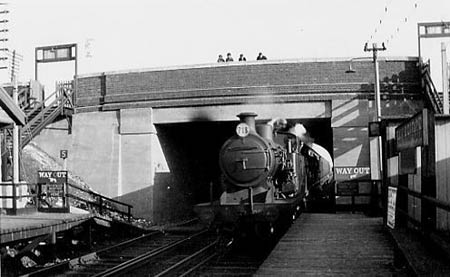|
This article was first published in the West Sussex Gazette on 21st July 1994.
This final chapter in the early life of Peter Longhurst, who at this time lived next to Ham Bridge Halt at East Worthing, reveals a saucy example of how one could be caught unawares on home leave from overseas wartime service.
Peter left school, officially, at the age of 14 just prior to the Battle of Britain in 1940. Two days later he started work at Lancing Carriage Works (now redeveloped as the Churchill Industrial Estate) in the machine shop office before being 'volunteered' as a sweat-producing rivet lad. 'I worked a 58½ hour week on my first job for 10s 4d (52 pence in today's money). Each time the siren went we'd traipse off to the air raid shelters.
We had to spend hours there and lost so much manufacturing time that eventually we were provided with shelters inside the building. The idea was that spotters on the roof would signal when danger was imminent. Then on one particular occasion during the Battle of Britain, it was just before midday, the Works was bombed. It happened so suddenly we were caught unawares. We were caught still working when the bomb exploded.'
Peter was employed for three years at the Works which contributed to the war effort: carriages were converted into hospital trains; tank transporters were built; and Horsa gliders were constructed in preparation for D-Day.
Leaving home for work one morning, walking down the back garden path as usual to hop over the fence and onto the station platform, Peter was startled by the roar of a plane coming in low. 'As it turned overhead I saw the black German crosses on the underside of its wings. I watched it drop its bombs in the direction of the gas and electricity works in Park Road. I shouted to mother. She replied 'Your dad's in there.' '
Peter's father, who worked for Hall & Co hauliers during the war driving one of their quaint carts with two large wooden spoked wheels and pulled by a single horse, was making a delivery to the gas works when the enemy plane struck. 'The horse was very frightened by the noise from the engines of the low flying bomber and father told me how he had to hold his horse firmly to stop it bolting.'
As it happened, they were lucky, for that particular bomb hit the steel girders supporting the gasometer and bounced off without exploding.
After the German occupation of France when invasion of our island was threatened, Peter's father worked on
building anti-tank concrete blocks along the seafront promenade.
In 1943, Peter enlisted in the Royal Navy as a signal boy.
During the war, Ham Bridge sported two mobile RAF guns, one on either side, while the adjacent Ham Bridge Halt was manned by two local girls: one covering the morning shift; the other, the afternoons. The station toilet at that time was a simple affair --- a bucket --- and so the Southern Railway built steps down from the platform and into the adjoining back garden of Peter's parental home in order that the two young ladies could relieve themselves with some dignity and decorum in the household's loo.
As you might imagine, this led to an interesting encounter which Peter recalls happened shortly before Christmas 1944. 'I'd just come home on my first overseas leave from the Mediterranean and knew nothing of the convenience arrangements. The back door opened. I was standing there in my underpants, ironing my trousers. In walked one of the station girls, who didn't look the least bit embarrassed, saying 'I knew you were here when I saw a sheaf of bananas hanging on the back door; let me make you a cup of tea.' We ended up going out together during my leave.'
For 32 years after the war, Peter worked in Brighton 'B' power station at Portslade, retiring from there as shift boiler house chargehand --- the final link in a chain of events giving rise to a lifetime of loving steam

Ham Bridge Halt: Young boys on the new road bridge built just before the Second World War with its straight parapet watch a steam locomotive arriving. For the two girls running the station during the war, steps were built from the platform and into an adjoining garden so they could use the neighbour's toilet.
|
| |


